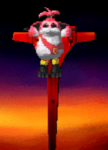APPLYING AUTEUR THEORY TO AMATEUR GAMES (PART I)
An analysis of some amateur game creators using a theory native to film criticism.
 Max McGee
Max McGee- 03/26/2010 03:22 AM
- 24368 views
Applying Auteur Theory to Amateur Games (Part I?)
An analysis of some amateur game creators using a theory native to film criticism.
An analysis of some amateur game creators using a theory native to film criticism.
Disclaimer: This article may contain a lot of things you already knew, especially if you are a community fixture. In a best case scenario, hopefully at least some of them are things you didn't KNOW that you knew. In spite of the haughty title, I don't believe any of this to be particularly high brow discussion. More "theory of how 2 maek gaems" than anything else.
In film criticism, one convenient definition of auteur theory is:
In film criticism, the 1950s-era auteur theory holds that a director's films reflect that director's personal creative vision, as if he were the primary "auteur" (the French word for "author"). In spite of - and sometimes even because of - the films in question being made as part of an industrial process, the author's creative voice is distinctive enough to shine through all kinds of studio interference. In some cases, film producers are considered to have a similar "auteur" role for films that they have produced.
Auteur theory applies better to some directors than others. (Fun fact. Some time in 2008, I was paid to rewrite and expand that article using the wikipedia article on the same subject as a template. I believe the financial backers of NWE are actually moonies. Anyway they've neglected to credit me in any way shape or form and I have no idea how much the article has changed in the two years since I've worked on it. End sidenote.)
Of course, in the sense of "creator as primary author" it is obvious that auteur theory applies to almost all amateur games, most of which have only one (primary) creator. However, another interpretation of auteur theory is that it allows us to analyze the underlying characteristics of a creator, rather than a creation; in this case, to look at the traits of a game maker rather than a game.
To see how well (or poorly) this aspect of auteur theory applies to amateur game making, I will be analyzing the work of a handful of game creators looking for common traits and tropes (like those found and identified in the Kubrick article) . To ensure that the stuff I'll be analyzing will be a nice, fat slow pitch right over the middle of the plate, I'm only going to look at creators who have made two or more games; if a creator is only known for one game, it is impossible to tell if that game's traits belong to that particular game, or are hallmarks of the creator's vision and style.In the interests of not talking completely out of my ass, I will only be looking at authors who have made more than one game that i personally have played. If this is well received (in other words, generates any discourse other than tl;dr, wut, or stfu) I may publish other articles like this in the future, focusing on different creators.
Without further ado, let's look at our list of amateur gaming auteurs. I have selected four. Note that I am not making any value judgments or critical appraisals here, positive or negative, merely describing the styles of different creators. Finally, this will be a trait-based analysis which means here: nice, convenient bullet-point lists rather than a paragraph structure.
CRAZE
The "Crazegame" is the most obvious, popular example of auteur theory as applied to amateur games. The author himself has even written an article about it. (Hey, free plug!) Anyway, I have always liked crazegames, long before I thought of them as an example of auteur theory in amateur games, in fact, before most people even thought they were any good. So let's look (from the outside) at what makes one tick.
*An almost obsessive focus on deep, rich, and balanced mechanics. Crazegames don't omit stories and it's not like they don't have graphics. But they ABOUT numbers. Whether by character customization, a fourteen character party, or seven stats that interact in a way never dreamed of before, it is the innovation of numbers and love of numbers that drives a crazegame unstoppably forward.
*Zany, madcap, self-referential sense of humor. I will punch you into fucking OBLIVIION AM I RITE?
*Innovation over functionality. Many crazegames are, after a few iterations, balanced to a tee and often have flawless internal logic. But often a steep difficulty curve, dense and little-explained mechanics, or both may make them difficult to access for casual players or in extreme cases, anyone who isn't the creator.
*A focus on quirky characters, often a lot of them, and their interrelationships. Or, as Craze puts it, "add homoghey". Relationships, homosexual, heterosexual, and just plain weird, reciprocated or not, always seem to exist in most crazegames (with the exception of the epic monster dungeon explore series). Characters > Plot.
*Dungeons & Dungeons. Like Dungeons & Dragons, only replace the Dragons with Dungeons. Craze focuses on dungeon design more than most developers, with the exception of RM auteur Brickroad, whose entire purpose for game creation appears to be dungeon design, judging by Kinetic Cypher.
KENTONA
THE A IS FOR ANDERSON.
*Old Skool Kenton Anderson's games look, sound, play, and feel like classic NES or SNES era 8-bit or 16-but jRPGs.
*Customization and Non-Linearity You can create and customize your character, choosing race, class, skills, and equipment, and then explore a wide open world, in most Kenton Anderson games.
*Genericness or Archetypicality Kenton Anderson's game worlds are intentionally archetypical and "Standard Issue". The setting, story, and classes are not rare, strange, or exotic but by design something we have seen in a hundred other RPGs. This allows the player to immediately access and interact with the game's tropes and has generated a mass appeal; Kentona even has a game CALLED "Generica".
*Triumph of Fun Fun factor always trumps graphical pizazz, grand storytelling, and ostentatious mechanics and features in Kenton Anderson's games.
*Broad and Deep Kenton Anderson's landmark game, Hero's Realm, is tens of hours long; all of his games offer significant replay value and numerous sidequests, presenting a massive experience.
VIDEOWIZARD
Man does this guy ever deserve some recognition and analysis. In his own words "I've been at making games for RPG Maker for almost 11 years! No, they're not ALL Dragon Kingdoms games, just most of 'em."
*EXTREME Loyalty to a Specific Universe In spite of the above quote, I believe that VideoWizard has released over ten games...all of which to my knowledge are set in the Dragon Kingdoms universe and are sequels, reboots, and remakes of earlier games. It gets more extreme when you consider the fact that the entire thing is (based on? closely linked to?) a webcomic series that has existed in one form or another since at least 2003. That is some INCREDIBLE dedication to a specific world and characters; the exact opposite of the creative ADD I was talking about.
*Unbelievable Stick-To-Itiveness and Dedication I mean for the love of god, and all that is holy, he completed DRAGON KINGDOMS IV over eight years ago!!! No one has been especially kind to VideoWizard and the reception for most of his games has been far less than warm. This hasn't stopped him from making a million games, all constantly improving but staying in the same vein. He's demonstrated the same staying power by promoting DK on a bewildering variety of sites over the years.
*Go! Go! Go! The Dragon Kingdoms game(s?) I have played were ridden with bugs and cripplingly, overly hard (cheap and unfair would be more like it). Of course, I made the mistake of playing some early entries in the series. They could have improved since then. My point, however, is that VideoWizard is someone who MAKES GAMES and does not agonize about getting every little thing perfect.
*STRONG DIY Ethic For a while now, VideoWizard makes all aspects of all of his games himself, even the aspects he is less than great at. This is commendable, as is the DIY custom graphics that have characterized most of his recent releases.
LYSANDER86
Lys is the man. End of preliminary notes.
*Story Is King Whether it's an original novel (A Blurred Line), an original short story (The Blue Contestant), an adapted novel (The Book of Three) or an adapted video game (Phantasy Star), Lys is dedicated to telling you a story. Everything else about the production serves that.
*Graphics are unimportant. Fact 1. Lysander obviously doesn't give a shit about custom doohickeys, graphical consistency, map design, or lighting effects. Fact 2. The community is obsessed with all of those things. Fact 3. The community loves Lysander and all of his games. Go figure.
*Mechanics make a game unique. From A Blurred Line's addictive 'Draw' system to The Blue Contestant's exciting 'Class Change' mechanic, Lysander's design of mechanics and systems is what distinguishes his game.
*The game isn't too hard, you just suck. Expect to deal with brutally difficult sequences (from racing minigames to boss battles) without ever getting the impression the game is cheap, unfair, or poorly balanced. Lysander games tend to be very difficult.
*Likeable characters in an unlikable world Lysander games feature characters that are memorable, like-able, and fundamentally good people; often the world they take place in seems to be innately corrupt, however. This leaves the real "villains" faceless and unseen.
I would write a conclusion to this...but I suddenly want to play ABL again...
So...whattayathink, sirs?
Posts 

comment=25416comment=25415That was a very ignorant thing to say, and it just proves the original comment about the "church" is right.
About the "church of Craze/kentona" comment: if other developers were active and actually did something worthwhile instead of screenshots of Rudras and FF6 rips, maybe it wouldn't just be about us. =0
No it doesn't, chief. It does not prove anything, really, except that Craze has disdain for a lot of us. (What a shocker.)
comment=25510comment=25416No it doesn't, chief. It does not prove anything, really, except that Craze has disdain for a lot of us. (What a shocker.)comment=25415That was a very ignorant thing to say, and it just proves the original comment about the "church" is right.
About the "church of Craze/kentona" comment: if other developers were active and actually did something worthwhile instead of screenshots of Rudras and FF6 rips, maybe it wouldn't just be about us. =0
.....eghhh......
There are things you can get away with in movies you can't do in games and vice versa. Things that work in one won't necessarily be well-received in the other.
comment=25872There are ton of similarities, though, and in reference to the topic of this article, I think that both mediums can have auteurs.
uhhh... looks like a fairly cut-and-dry statement to me!
comment=25878
What Kentona said is why I asked for him to elaborate.
him? the reason I'm not elaborating is because I just don't care to elaborate.
comment=25906
pretty much anything that requires individual creativity can have this
Yes, the only reason it's even a THEORY in film (as opposed to an obvious on the nose fact) is the fact that so many people are involved in the process of making a movie. The same is true of non-amateur game creation, which has produced only a few auteurs (people like Hideo Kojima and David Cage, for better for worse).
comment=25945
So you spout off random shit and don't back it up?
Gotcha.
random?
It's relevant to the topic and therefore not random.
back it up?
There are a few times I don't feel like having forum warz so I just state my opinion.






















